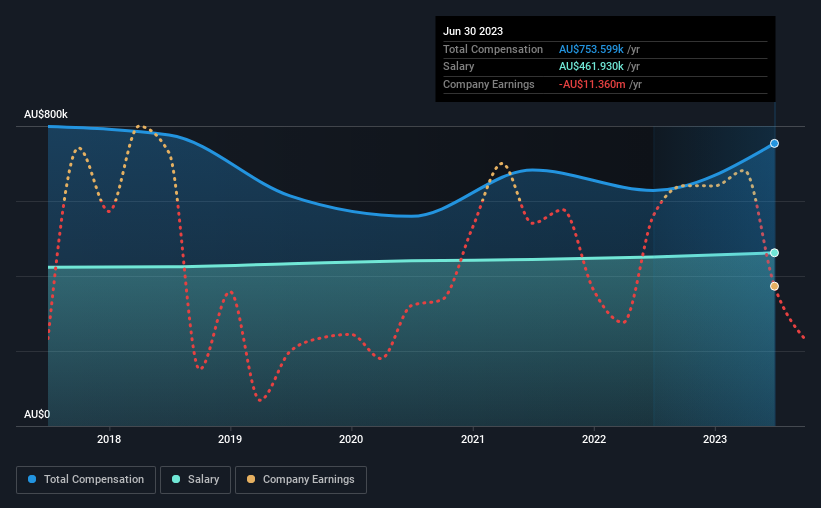Here's Why Shareholders Should Examine Pharmaxis Ltd's (ASX:PXS) CEO Compensation Package More Closely
Key Insights
Pharmaxis to hold its Annual General Meeting on 28th of November
CEO Gary Phillips' total compensation includes salary of AU$461.9k
The total compensation is similar to the average for the industry
Over the past three years, Pharmaxis' EPS fell by 4.1% and over the past three years, the total loss to shareholders 67%
The results at Pharmaxis Ltd (ASX:PXS) have been quite disappointing recently and CEO Gary Phillips bears some responsibility for this. Shareholders can take the chance to hold the board and management accountable for the unsatisfactory performance at the next AGM on 28th of November. This will be also be a chance where they can challenge the board on company direction and vote on resolutions such as executive remuneration. We present the case why we think CEO compensation is out of sync with company performance.
View our latest analysis for Pharmaxis
How Does Total Compensation For Gary Phillips Compare With Other Companies In The Industry?
According to our data, Pharmaxis Ltd has a market capitalization of AU$23m, and paid its CEO total annual compensation worth AU$754k over the year to June 2023. Notably, that's an increase of 20% over the year before. In particular, the salary of AU$461.9k, makes up a huge portion of the total compensation being paid to the CEO.
In comparison with other companies in the Australian Pharmaceuticals industry with market capitalizations under AU$305m, the reported median total CEO compensation was AU$646k. So it looks like Pharmaxis compensates Gary Phillips in line with the median for the industry.
Component | 2023 | 2022 | Proportion (2023) |
Salary | AU$462k | AU$451k | 61% |
Other | AU$292k | AU$177k | 39% |
Total Compensation | AU$754k | AU$628k | 100% |
On an industry level, around 61% of total compensation represents salary and 39% is other remuneration. There isn't a significant difference between Pharmaxis and the broader market, in terms of salary allocation in the overall compensation package. If salary dominates total compensation, it suggests that CEO compensation is leaning less towards the variable component, which is usually linked with performance.
A Look at Pharmaxis Ltd's Growth Numbers
Over the last three years, Pharmaxis Ltd has shrunk its earnings per share by 4.1% per year. Its revenue is down 34% over the previous year.
Overall this is not a very positive result for shareholders. And the fact that revenue is down year on year arguably paints an ugly picture. So given this relatively weak performance, shareholders would probably not want to see high compensation for the CEO. Moving away from current form for a second, it could be important to check this free visual depiction of what analysts expect for the future.
Has Pharmaxis Ltd Been A Good Investment?
The return of -67% over three years would not have pleased Pharmaxis Ltd shareholders. So shareholders would probably want the company to be less generous with CEO compensation.
In Summary...
Along with the business performing poorly, shareholders have suffered with poor share price returns on their investments, suggesting that there's little to no chance of them being in favor of a CEO pay raise. At the upcoming AGM, the board will get the chance to explain the steps it plans to take to improve business performance.
While CEO pay is an important factor to be aware of, there are other areas that investors should be mindful of as well. We did our research and spotted 5 warning signs for Pharmaxis that investors should look into moving forward.
Of course, you might find a fantastic investment by looking at a different set of stocks. So take a peek at this free list of interesting companies.
Have feedback on this article? Concerned about the content? Get in touch with us directly. Alternatively, email editorial-team (at) simplywallst.com.
This article by Simply Wall St is general in nature. We provide commentary based on historical data and analyst forecasts only using an unbiased methodology and our articles are not intended to be financial advice. It does not constitute a recommendation to buy or sell any stock, and does not take account of your objectives, or your financial situation. We aim to bring you long-term focused analysis driven by fundamental data. Note that our analysis may not factor in the latest price-sensitive company announcements or qualitative material. Simply Wall St has no position in any stocks mentioned.

